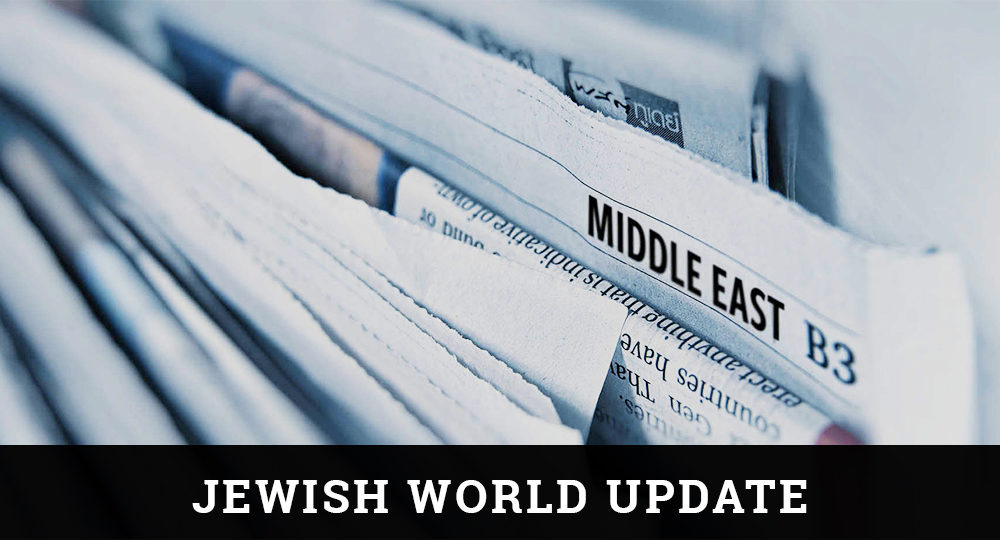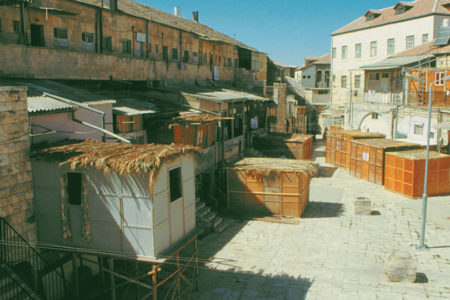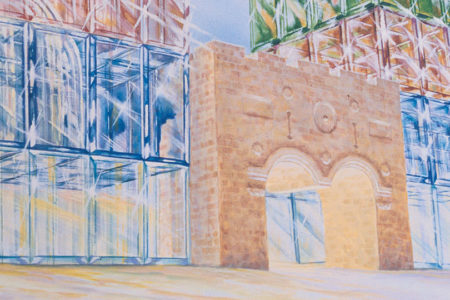Israel in the News Sep/Oct 2001
Three out of four Palestinians support suicide bombings
A poll conducted in the West Bank and Gaza Strip reveals that three out of every four Palestinians support suicide-bomb attacks against Israel.
According to an Internet report on Yahoo!® News, the poll was conducted by the Palestine Center for Public Opinion from May 24 through 26 and showed 76 percent of respondents favored “operations like the May 18 suicide blast in the northern Israeli coastal town of Netanya, which killed five Israelis and the bomber.
“Only 12.5 percent opposed such tactics and 11.5 percent had no opinion,” Yahoo!® reported.
Asked if they would resist halting the intifada should Palestinian leader Yasser Arafat request them to do so, 49 percent said they would resist; 34.4 percent said they would not; 16.5 percent did not respond.
Yahoo!® said 38 percent supported a ceasefire by both sides; 43.6 percent opposed one; and 18.4 percent were undecided.
End of kibbutzim?
The famed kibbutzim that were the backbone of Israel in its early days may be breathing their last breath.
According to a report in Ha’aretz, senior kibbutz leaders and Agriculture Minister Shalom Simhon “have been discussing the prospect of making fundamental changes to the structure of kibbutzim—possibly turning them into small farming communities (moshavim) or some other form of less-communal agricultural entities. This would spell the end of the kibbutz as we know it today, closing a chapter of Zionist history represented by the unique collective farming communities.”
The changes include giving members the right to buy and sell their housing units. But the farmland, cowsheds, chicken coops, and factories would continue as collectives, owned by kibbutzniks who all have shares in these productive assets, Ha’aretz said.
Only about two percent of Israel’s 5.2 million Jewish residents live on the nation’s 260 or so kibbutzim. But they have produced several great leaders, most notably the late David Ben-Gurion, an architect of the modern nation and its first prime minister.
Ha’aretz reported that kibbutz leaders strenuously object to the Agriculture Ministry’s proposal. Natan Tal, secretary general of the Takam kibbutz movement, said kibbutniks have not formally discussed such far-reaching changes. Simhon said the kibbutzim themselves appealed to the Agriculture Ministry about considering a major reform, but added that the idea was still in its early conceptual stages, the newspaper said.
Israel still supplies Jordan with water despite dire shortage
Although Israelis are suffering through what has been called the worst water crisis in the nation’s history, the government continues to provide 50 million cubic meters of water a year to neighboring Jordan.
“We decided to continue the supply of water, in light of our relationship with Jordan,” said Avigdor Lieberman, national infrastructure minister.
Israel was obligated to provide Jordan with water through May 1999 under the 1997 Akaba Agreement. But that agreement expired, and severe drought threatens the country’s fresh water supply.
The Jerusalem Post reports that local authorities have been told to cut water consumption by 15 percent or face the consequences. Israel is running 400 million cubic meters of water short. Lieberman and Water Commissioner Shimon Tal have told all municipalities, councils, moshavim, and community villages to curtail consumption. All authorities must give Tal’s office detailed plans showing how they plan to save water.
“As a result of this emergency situation, everything has to be done to save water to prevent a reduction in drawing water which would lead to cutbacks and disruptions in supplies,” Tal said.
Israel offers
to treat all Palestinian wounded
THE JERUSALEM POST—Health Minister Nissim Dahan has several times offered to treat “all Palestinians wounded in the current intifada in Israeli hospitals and at Israeli expense,” but the Palestinians have not bothered to reply, Dahan has told The Jerusalem Post.
He said the idea—which he first raised publicly at the annual World Health Assembly in Geneva last spring—has not received any response from Palestinian leaders, including Palestinian Authority Health Minister Riyad Za’anoun, who also was in Geneva. “There is nobody there [among the Palestinians] to talk to,” Dahan added.
He also made the proposal to the U.S. secretary of health and human services and again indirectly in a meeting with Russian Ambassador Mikhail Bogdanov.
Dahan said the idea of treating at Israel’s expense all the Palestinian wounded was approved by the government “on the first day of its tenure” and was based on the humanitarian principles set down by the Geneva Convention and the International Red Cross. Although Israel is not responsible for the violence, Dahan noted, Palestinian medical facilities are unable to treat many of their wounded adequately.
Dahan said he believes the Palestinian leadership has not responded and means to reject the idea “because of the number of their wounded,” which is lower than figures they publicize.
Negev Beduins get free eyeglasses
THE JERUSALEM POST—Free eyeglasses—for some, their first pair ever—have been distributed to 70 elderly Beduin residents of the Negev town of Rahat. The spectacles, each suited to the recipient’s eyes, were distributed by Ben-Gurion University after a team from its social work department discovered that many needed, but could not afford, glasses.
The team, headed by researcher Dr. Esther Iecovich, examined the eyes of 88 Rahat residents over the age of 65, with the help of a local Beduin optometrist. To their surprise, they found that 70 of them had never had eyeglasses, but suffered from nearsightedness or other visual problems that prevented them from functioning normally.
The BGU social worker said it was likely that some of the recipients were getting nursing care because their vision problems prevented them from being independent.
Israeli surgeons save life of PA policeman’s son
THE JERUSALEM POST—Israeli surgeons in Haifa’s Rambam Hospital have saved the life of the newborn son of a Palestinian policeman from Gaza.
The surgeons performed complicated heart surgery, saving the 21/2 -month-old infant, Hussein Raslan. Raslan, who lives with his parents at the Jabaliya refugee camp, is in serious but stable condition. The infant was born through normal delivery, but three weeks later he suffered from shortness of breath and doctors at a Gaza hospital said he had a serious congenital deformation of the heart.
The voluntary organization Or Lagoyim (A Light Unto the Nations) contacted Dr. Abraham Lorber of the pediatric cardiology unit at Rambam Hospital. Lorber arranged for the baby’s transfer to the hospital. There, the infant was diagnosed and underwent surgery. Or Lagoyim financed the treatment costs, which were reduced to a nominal fee by the hospital.
“I’m happy my child was treated by them,” the infant’s mother, Manel Raslan, said. “I wasn’t afraid to come here. We are being treated very well and I hope that one day there will be peace between our two peoples. When I came here, I didn’t think about the intifada. I knew that in Israel, they would help my son. I found wonderful people, and the Jewish nurses take care of us round the clock.”
Jerusalem youths help their neighbors
THE JERUSALEM POST—The floor of the Jerusalem schoolroom just after 1 P.M. on Friday is flooded with piles upon piles of food neatly being packed away into 100 large cartons. An energetic team of youngsters in their 20s is divvying up the tuna, bread, eggs, potatoes, cakes, yogurt, and bottled drinks strewn all around.
It happens every week at this time. Aptly called “Good Neighbor,” this organization of several dozen young volunteers gathers to collect and deliver packages of foods to needy Jerusalem families.
Work begins early in the week, when the youngsters drop off baskets at several neighborhood kiosks, a sign asking people to pitch in a package of sugar, an extra loaf of bread, an additional carton of eggs.
Friday morning the baskets are collected—and together with 200 loaves donated by Angel’s bakery and chicken and milk products bought with donations, the weekly baskets are prepared and delivered to the needy.
The lists of recipients are prepared by social workers, and include the elderly, one-parent households and large families.
The volunteers stress that while they appreciate donations from businesses and larger organizations, theirs is a small, person-to-person operation. One of its goals is to get families in more affluent neighborhoods personally involved in helping the needy in their area.
One of the nicest things, explains 23-year-old volunteer Efrat Degani, a student at Hebrew University, is that the organization is a vibrant mix of secular and religious youth working together as one.
“It’s a question of people taking responsibility for their neighbors,” she said.
In the crowd of enthused youth at work last Friday, several off-duty soldiers were busy at work, donating their one day a week off for the cause.
“It’s really a lot of fun, and I do not feel it’s difficult work” said Michael Gilad, an officer in the Golani Brigade. “In the army, as part of the military setup, you don’t always strongly feel that you are directly contributing, while here you really feel it,” he said.
The group does not stop at passing out food for the needy. With its meager funds, but seemingly endless desire to do good, it hopes to expand, to aid needy children with education and to open computer classes.
Asked how long the group plans to keep up the “meals on wheels” project, 22-year-old Eran Ben-Ari replies, “so long as there are poor people, we will continue.”







